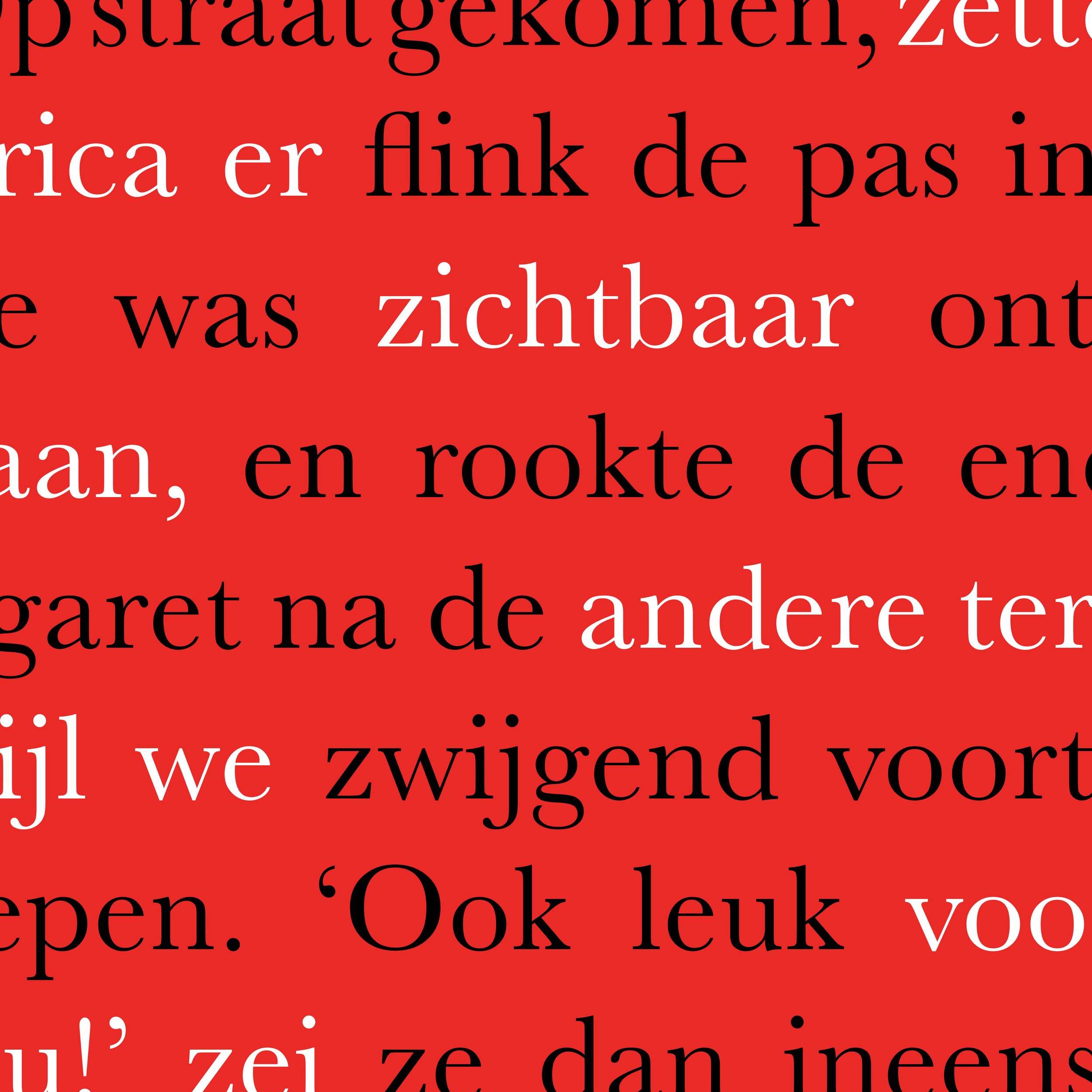On a Sentence from “The Tree and The Vine”
Kristen Gehrman
Op straat gekomen, zette Erica er flink de pas in. Ze was zichtbaar ontdaan, en rookte de ene sigaret na de andere terwijl we zwijgend voortliepen.
‘Ook leuk voor jou!’ zei ze dan ineens.
‘Niet bepaald, wat was er aan de hand?’
‘Dat begrijp jij toch niet,’ was het antwoord.
Ik had me de hele middag al als een geslagen hond gevoeld en dat deed de deur dicht. Aan de overkant van het plein dat we kruisten, zag ik de ingang van de metro en zonder een woord stevende ik erop af en zocht de trein naar het hotel. Ik had Erica nog mijn naam horen roepen, maar ik negeerde het. Gedurende de rit zakte ik weg in een depressie die me voor ieder lichtpuntje blind maakte.
Out on the street, Erica took off at a brisk pace. She was visibly upset, smoking one cigarette after another as we walked in silence.
“I hope you enjoyed that,” she said suddenly.
“Not particularly. What happened?”
“You wouldn’t understand,” she replied.
I’d felt like a beaten dog all afternoon, and that was the last straw. Without a word, I beelined for the metro station on the other side of the square and looked for the train to the hotel. I heard Erica calling after me, but I ignored her. On the ride back, I sank into a depression so deep that it blinded me to all light.
While translating the dialogue between Bea and Erica, I often found myself relying on my understanding of the characters’ complex personalities and the tone. Dola de Jong seems to have wanted it this way, as the words exchanged between the two women are often sparse, and nuances can be very subtle. The romantic tension between the two of them is achingly palpable but remains unspoken. Even in hindsight, the older and wiser Bea can’t quite put words to it—though as our narrator, she does offer us a window into her emotions. Erica, on the other hand, is more mysterious. What we know about her character is largely limited to her words and actions. Her emotions can be so volatile that determining how she might sound in a given situation required a dissection of the entire scene.
In this example, Erica has just had a falling out with her current love interest, Judy, while Bea watches sheepishly from a distance. Erica storms out of the department store and says to Bea “Ook leuk voor jou!”, literally “Also nice for you!” Nice? In what way? What does Erica mean here, exactly? In Dutch, leuk is a simple, everyday word that could be translated a variety of ways depending on the tone and context. So, what’s the tone here? Is Erica showing empathy toward her friend because she had to witness the whole messy ordeal with Judy? Or is she attacking Bea with the sarcastic insinuation that she can now rejoice that she’s got her secret crush back to herself? The text doesn’t offer a lot to go on here, thus the only way to understand this rather cryptic remark, as well as Bea’s unusually strong reaction to it, is to consider Erica’s tone. The comment, and the subsequent suggestion that Bea “wouldn’t understand”, causes Bea so much pain that she abandons Erica on the spot and heads for the metro, where she sinks into a deep depression. It’s as if Bea is realizing for the first time that she has amorous feelings for Erica and—to her horror—that Erica already knows it. Did she enjoy Judy and Erica’s little fight? Maybe she was jealous, maybe Erica had wanted her to be jealous. By translating Ook leuk voor jou!” as “I hope you enjoyed that!”, we not only feel the aggression and cynicism in Erica’s tone, we also better understand Bea’s turmoil and her impulsive decision to leave.
Kristen Gehrman lives in The Hague, The Netherlands. Originally from Charleston, South Carolina, she studied linguistics and literary translation at the University of Lausanne, Switzerland. In addition to her work as a literary translator, she teaches translation, editing, and writing at Leiden University and VU Amsterdam.


